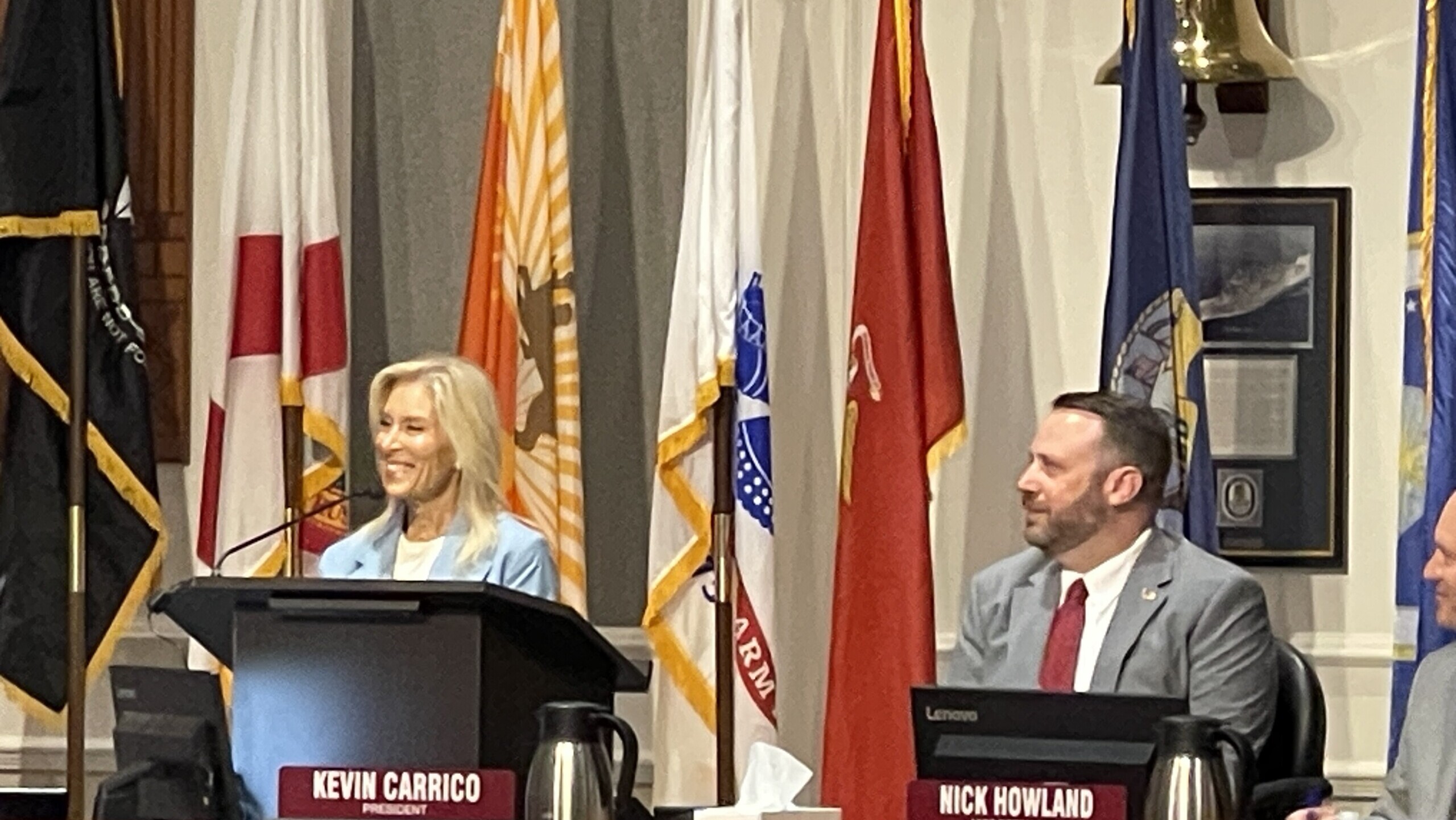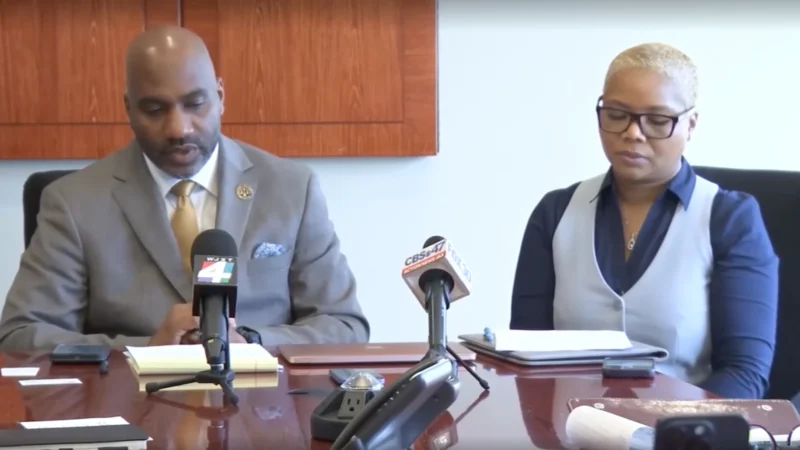Updated at 7:29 p.m.
Mayor Donna Deegan unveiled her proposed $2.017 billion budget and $678 million capital improvement plan before a special meeting of the City Council on Monday.
She appealed directly to Council President Kevin Carrico to work together to maintain the city’s momentum.
“He believes — just as I do — that the decisions we make in the present will ripple out for generations to come. And we have no time to waste,” Deegan said in her speech to City Council. “When we delay, defer, or distract — we don’t just lose days, weeks and months. We lose momentum. That’s why this budget is not just balanced — it is urgent.
“Momentum is a fragile, fleeting thing.”
Deegan’s 2025-26 budget is about $50 million more than what she proposed in 2024 and $137 million more than City Council ultimately approved.
It keeps the city’s property tax millage rate steady but still shows an increase in ad valorem tax revenue due to growth in the city’s property tax base, according to administration officials.
Her spending priorities outlined in the budget weigh heavily toward public safety, health care, housing, roads and parks.
The budget “delivers every request made by Sheriff (T.K.) Waters,” she told council, with $638 million for the Jacksonville Sheriff’s Office — up nearly $5 million from last year — and $387 million for the Jacksonville Fire and Rescue Department, mostly driven by increased wages.
Although spending on infrastructure projects is front and center in the her capital plan, there was a modest reduction in the public works budget compared to last year — down nearly $3 million to $64.32 million.
The Parks, Recreation and Community Services Department would see an increase if the budget is approved from $57.67 million to $58.78 million. And public libraries also get a funding hike from $40.867 million to $42.39 million.
The budget sets aside $56 million for UF Health Jacksonville projects and $7.1 million for health programs including city-sponsored telehealth, eldercare food insecurity, pediatric mental health and other health care programs, and the 988 call center.
The mayor wants to fund 153 projects over the next year totaling $678 million, according to the administration’s capital improvement plan.
There’s $51 million for road resurfacing, sidewalk repair and new construction and intersection improvements.
The capital plan includes $210 million previously approved as part of the city’s cost split with the Jacksonville Jaguars on the $1.4 billion stadium renovation project.
For sports and entertainment, the city also would appropriate $3.56 million to the baseball grounds to meet Major League Baseball requirements for the Jacksonville Jumbo Shrimp.
The plan also would appropriate pledged funding for riverfront parks currently under construction or in the planning stages Downtown and the Museum of Science & History’s future Northbank location.
Work on Metropolitan Park would get $12.5 million; MOSH building relocation and park design, $20 million; $20 million for Riverfront Plaza; and $54.7 million for the planned Shipyards West Park on East Bay Street.
There’s $26 million for park improvements countywide and money for city-funded segments of the Emerald Trail.
Here are a few of the capital projects highlights:
- New Berlin Road, Cedar Point to Starrt/Pulsky: $20 million.
- Old Middleburg Road at 103rd, Branan Field: $20 million.
- Hollybrook Park environmental assessment and remediation: $14.3 million.
- Newt Fire Station No. 67 and Soutel Drive and Sibbald Road: $13.3 million.
- Cedar Point/Sawpit Road, New Berlin to Shark: $13 million.
- Chaffee Road: $17.2 million.
- Emerald Trail, Hogan’s Creek to Riverwalk: $8 million
- Fuller Warren Bridge Park: $8 million
- Emerald Trail, Hogan Street Connector: $7 million.
- Drainage system rehabilitation: $6 million.
- Equestrian Center Cattle Barn: $6 million.
- Drainage system rehabilitation: $6 million.
- Metropolitan Park Marina Fire Station, Museum & Dock: $4.83 million
- Jacksonville Zoo Improvements: $4 million.
- Huguenot Park: $3 million.
- Earl Johnson Park: $2 million.
In her speech Deegan said the city is “restriping, repaving, replanting, filling potholes, and mowing at an historic pace.”
Each of the 14 district council members also receives $1 million in the capital plan for projects in their districts, part of the city’s Community Benefits Agreement with the Jacksonville Jaguars under the stadium renovation deal.
Septic tanks
The Deegan administration has allocated $9.2 million in this budget to put toward the city’s effort to phase out aging and compromised septic tank systems across Duval County.
The city and JEA officials have been debating for years the pace and amount of public money to put toward removing compromised septic tanks, which are considered and environmental and economic hazards.
City officials say it’s a $1 billion problem, but Deegan told reporters Monday the labor intensive process inhibits the speed at which issue can be addressed. She says the goal is to budget for what can “realistically get done” in a year.
“There’s only so much progress you can make when you combine the fact that you have to get buy-in from that community, you have to get all that equipment in and get that work done, and it is absolutely a laborious process.” Deegan said. “So we really are investing as much as we can possibly get done in any given year.”
Affordable housing and homelessness
After a University of North Florida poll in June identified housing as the most important issue facing Duval County, Deegan has earmarked $12 million in the budget for affordable housing and homelessness programs.
There’s $2 million in “capital stack development funding” which would provide money for developers building affordable housing; $750,000 for attainable housing utility tap-ins, which defray the cost of connecting to the power grid; and $500,000 in emergency rental assistance.
There are also dollars for shelter bed expansion, transitional housing and mental health assistance for chronically homeless individuals.
Paying for economic incentives
The bills are coming due for millions of dollars in private incentives offered to companies and developers by the city Downtown Investment Authority and the Office of Economic. XXXXXXXX
The budget covers $46.8 million in previously approved DIA awards and $18.1 million from the economic development office.
Those one-time expenses are partially cushioned this year due to a $40 million one-time bump in public utility JEA’s contribution to city coffers, which allowed finance officials not to pull from the city’s savings account.
How it’s paid for
The Deegan administration will pay for more than half of the $2.017 billion budget by property tax revenue, which the Deegan administration projects will rise to from $1.103 billion to $1.19 billion over the 2025-26 fiscal year after excluding the dollars that go to special taxing districts throughout the city.
The second largest chunk comes from shared revenue from the state, which is slated to drop by more than $8 million from last year. The city will get $232.56 million from Florida’s coffers. The remaining expenses will be paid for by various city fees, investments and charges for services.
Deegan made a point in her speech Monday that her budget proposal takes nothing from the city’s projected $370 million in operating reserves and $133.84 million in the emergency reserve — a touchy subject for the Republican-led council over the last two years.
Tax revenue growth, coupled with the help from JEA, allowed the Deegan administration to avoid the city’s savings account, she said.
For Carrico, keeping the reserve funding intact is one of the key things he was listening for in Deegan’s address.
“It’s balanced, not dipping into the reserve. I think that is important — to take care of those reserves for all the taxpayers and wait for opportunities where we really need to use those,” the council president told Jacksonville Today. “And the fact the police is fully funded at 100%, fire is funded at 100%, and the Kids Hope Alliance is funded over what they were last year, those are three things that are very important to me.”
The Deegan administration is proposing to use borrowing to pay for $546.98 million of the $687.15 million capital improvement projects proposed Monday. The remaining $140 million is paid for with cash on hand, also called Pay-Go; fuel and bed taxes; and grants.
At least in this budget, the administration of the city is not projecting a revenue shortfall in the near term. But the City Council auditor previously has projected expenses will overshadow the city’s income by about $105 million in 2028.
Deegan’s capital improvement plan goes out four years to 2029 with about $1.759 billion in projects. The year-by-year breakdown shows about a $263 million drop off in project spending from 2028 to 2029.
“If we added nothing new, it would take us up to 10 years to get it all done. Adding new projects means adding new debt. Doing that without adding capacity to get those projects completed in a reasonable timeframe hurts our financial health,” Deegan said in her speech.
“Our strategy is to be responsible and close the list to new debt-funded projects for the next few years. Additional needs will come up. When they do, they should be “pay go” projects — in other words, paid for with cash.” she said. “This strategy will strengthen the city’s already strong financial posture and get projects done in a timely manner.”







